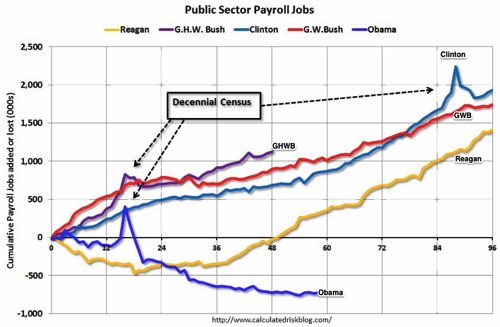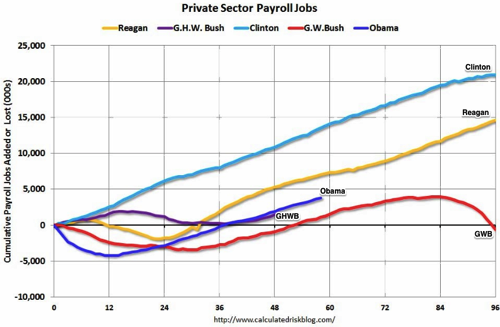I Agree with Bob Greenstein and Larry Mishel: Budget Deal Does Little **Almost Nothing at All** to Address the **Dire** Needs of the Economy
Perhaps a couple of charts from the estimable Barry Ritholtz (but Barry is still estimable) very estimable [Calculated Risk](http://www.calculatedriskblog.com) will help get the point across: one of the many big problems of the U.S. economy is that the U.S. government has indeed–as Barack Obama wrongly urged us to do in his 2010 State of the Union Address–tightened its belt in the aftermath of the crisis. As almost every real economist knows, a time in which government credit is extraordinarily good and idle resources are extraordinarily large is a time for government to borrow-and-spend, to leverage up, and so keep the private sector’s desire to leverage down from causing lost decades–yes, we are now going to start speaking of “lost decades” in the plural:


Larry Mishel: Budget Deal Does Little to Address the Needs of the Economy:
While all the details have yet to be released, it seems clear that the budget agreement announced by Senator Patty Murray and Representative Paul Ryan, which sets discretionary budget authority limits for fiscal years 2014 and 2015, will do essentially nothing to alter the disastrous trajectory that has characterized fiscal policy since 2011. I support reaching an agreement that will end the culture of periodic crises that has driven policy in recent years. However, this deal addresses the wrong set of priorities: deficit reduction ten years out rather than a stronger recovery now, and tweaking domestic spending for a few years as we continue to ignore the public investments our country needs.
The worst part of the budget deal by far is what it doesn’t address: unemployment insurance for America’s four million long-term unemployed workers. This deal asks essentially nothing of the richest Americans while placing terrible burdens on new federal employees and the unemployed, and continuing the fiscal policy drag on our still-unfinished recovery…

